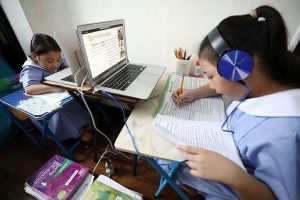VP rejects calls to delay classes until September

VICE President and Education Secretary Sara Duterte-Carpio on Thursday said classes would start on Aug. 22 amid a coronavirus pandemic, despite calls to move the new school year to September.
President Ferdinand R. Marcos, Jr. had approved the plan and the Department of Education (DepEd) already released an order to enforce it, she told a news briefing on Thursday. “We will proceed with the plan.”
The Teachers’ Dignity Coalition earlier asked DepEd to move the school year to mid-September or the first week of October to give teachers more time to rest and prepare, saying they had been working even during the break.
Under the order, all public and private schools must transition to five days of face-to-face classes.
“Starting Nov. 2, all public and private schools shall have transitioned to five days of in-person classes,” according to the order made public on Tuesday. Pure distance or blended learning except for schools that are implementing an alternative mode won’t be allowed.
DepEd said it would give schools “ample time to slowly transition” by implementing any of the following options: five days of face-to-face classes, blended learning, three days of in-person classes and two days of distance learning, four days of in-person classes and a day of distance learning or full distance learning. Schools may enforce these until Oct. 21.
But Ms. Carpio said private schools that fail to start physical classes on Nov. 2 won’t be penalized.
Some private schools have said they would not implement five days of in-person classes, citing their dialogues with parents.
Ms. Carpio’s first order Education chief suggests physical distancing “whenever possible,” fueling discussions about staff and classroom shortages.
Ms. Carpio said the state does not want to burden schools by mandating physical distancing and requiring them to build more classrooms.
She said the co-mingling of vaccinated and unvaccinated children against the coronavirus would not be a problem once physical classes resume.
Unvaccinated students would not be discriminated against, she added.
“We gave the recommendation to the president and he approved it,” she said. “There should be no segregation and discrimination against unvaccinated learners because our COVID-19 vaccination program is not mandatory.”
“We do not see any problem with co-mingling in schools,” she added. “Once students leave schools, they would all share spaces — in homes, malls, churches and private transportation.”
Meanwhile, 94% of Filipino adults want their children to return to physical classes, according to a Pulse Asia Research, Inc. survey.
Only 4% were neutral and 2% disagreed, Senator Sherwin T. Gatchalian, who commissioned the survey, said in a statement.
“If we listen to our countrymen, we will see a very strong call for the return of face-to-face classes,” Mr. Gatchalian, who heads the Senate education committee, said in Filipino. “We can no longer postpone the return of our youth to school and we must no longer let the education sector lag behind as we rise above the pandemic.”
He said postponing physical classes could cause deeper economic scars due to learning loss.
Pulse Asia interviewed 1,200 adults on June 24 to 27 for the survey, which had an error margin of ±2.8 points.
A year of school closures costed about P10.8 trillion in productivity and wage losses over the next 40 years, according to the National Economic and Development Authority.
Mr. Gatchalian cited the need to boost school-based vaccination to protect students from the coronavirus.
Vaccination among children 5 to 11 years old remained low, he said. As of July 7, only 3.6 million or 26% of the target 14 million children have been fully vaccinated. For minors aged 12-17, however, 9.6 million or 86% of the target 11.4 million have received their first dose. — Alyssa Nicole O. Tan




